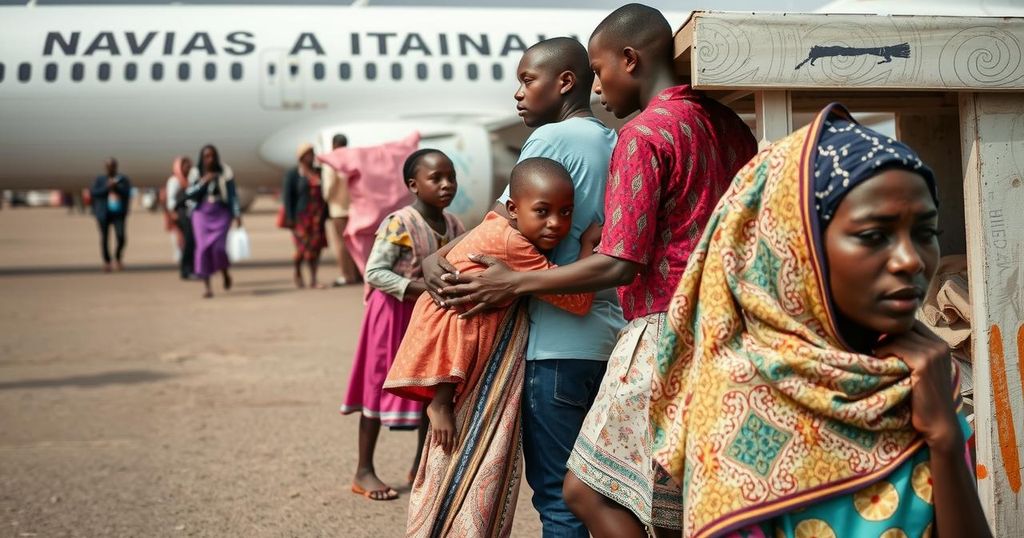Malawi is experiencing an influx of around 13,000 refugees from Mozambique due to escalating post-election violence. The recent unrest, sparked by a contested election result, has led to widespread looting and violence, forcing numerous families, including Manase Madia’s, to flee. The situation reflects historical mass migration patterns and highlights urgent humanitarian needs as local resources are strained by the refugee crisis.
On a bright Saturday afternoon, Manase Madia, aged 50, presents his Mozambican identity card, once a symbol of his pride but now a testament to his uncertainty. In recent weeks, he has witnessed the destruction of homes and businesses, including his own. Fleeing from fears for his family, which has been dispersed by violence, he is among approximately 13,000 individuals who have crossed into Malawi in search of refuge from post-election unrest in Mozambique.
The ongoing violence in Mozambique follows the contentious election held on October 11, which resulted in Daniel Chapo of the ruling Frelimo party being declared the winner over Venâncio Mondlane of the opposition. Violence intensified after Mozambique’s constitutional council upheld the election results in December, transforming political protests into widespread looting targeting affluent community members, like Madia, by armed gangs.
Madia recounts his harrowing escape, having been warned of impending attacks against him and his family. To evade the marauding groups, he fled on a motorbike with his wife and one child, leaving behind his destroyed shop and stolen livestock. Many of his relatives remain concealed in hiding, indicative of the pervasive fear within his community.
The journey to Malawi, often spanning 30 miles with little more than the clothes on their backs, was made by numerous refugees. Despite their own struggles with severe food shortages exacerbated by drought, Malawians have been welcoming, recognizing the shared language and experiences between the two nations. The president of Malawi has declared a state of disaster and appealed for international assistance.
To accommodate the influx of refugees, local governance and humanitarian agencies, including the UN Refugee Agency, have set up temporary camps at three designated centers. Judith Fukizi, representing the International Red Cross’s Restoring Family Links initiative, is actively assisting families separated by the violence. She notes that the most vulnerable, including children, are often left without their parents amidst the chaos.
Hilda Katema Kausiwa from Malawi’s Ministry of Homeland Security acknowledges the ongoing need for sanitation and health monitoring as refugees impact local resources. Authorities have earmarked substantial land for housing and services for the refugees, while actively seeking additional support to meet the growing demands.
In light of this humanitarian crisis, Mike Dansa, chair of Nsanje civil society organizations, emphasizes the increasing strain on local resources and the necessity for comprehensive support not only for asylum seekers but also for the host communities, which have shown remarkable solidarity. He advocates for systemic humanitarian improvements and sustainable measures addressing the immediate needs and long-term ramifications of such displacement.
The text discusses the surge of refugees from Mozambique into Malawi caused by violent post-election turmoil following the October 11 election. This situation echoes a historical context where Mozambique went through a civil war leading to mass migration to Malawi during the 1980s and early 1990s. The current political unrest has resulted in significant violence, targeting individuals based on their economic status, prompting many to seek safety in Malawi amid ongoing humanitarian crises, including food shortages in the host country.
The plight of refugees fleeing violence in Mozambique reveals a significant humanitarian crisis impacting both the migrants and host communities in Malawi. With thousands of individuals escaping persecution, the urgent need for support and resources becomes paramount. This situation underscores the necessity for international solidarity and the implementation of sustainable solutions to address the complexities of migration and humanitarian assistance during such tumultuous times.
Original Source: www.theguardian.com






